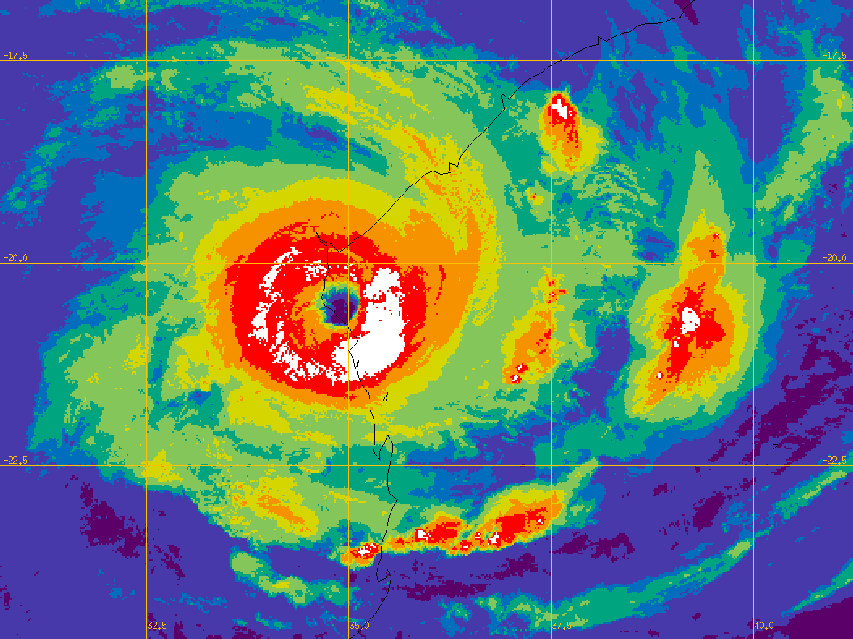
A. Honors Student
Research Projects
These research projects were completed independent of the classroom and under the mentorship of university faculty.
Satellite Based Quadrant Analysis of Tropical Cyclones in the South Indian Ocean
Understanding satellite based data associated with the life-span of tropical cyclones is critical for the future of forecasting and public safety. Meteorologists and engineers are baffled by the low degree of predictability associated with a tropical system’s ability to change beyond a twelve hour forecast window. This can be improved through data analyzation of each of the four quadrants over three hour periods from development to landfall. This study in particular focuses on storms within the South Indian basin comparatively assessed with tropical cyclone Leon-Eline over its 29-day duration. Strength factor will be measured focusing on remote sensing values obtained through the Tropical Rainfall Measuring Mission (TRMM) satellite. By determining the most stable quadrant possessing the highest weather hazards technological advancements can be made, prediction timelines can be decreased, and public awareness increased.
By Samantha Allen, Faculty Mentor: Dr. Corene Matyas, University of Florida, completed for the Geosciences Engagement & Outreach Program, 2015-16. Presented at the 2017 Southern Regional Honors Council Conference.
Cardiac Regenrative Therapy for Dilated Cardiomyopathy in Dobermin Pinchers with PDK4 gene mutation
Dilated cardiomyopathy (DCM) is a common cardiac affliction in people and dogs. The Doberman Pinscher is a canine breed affected with DCM more than any other dog breed, accounting for at least 50% of all cases of canine DCM. They have a very high morbidity and mortality rate. The disease has been shown to be inherited as an autosomal dominant trait with incomplete penetrance.
Prior to knowing the specific genetic mutation in this breed, regenerative strategies used by our group of researchers included the use of stem cell therapy to promote repair in damaged myocardial tissue using rat and swine models. An improvement in the ejection fraction was noted up to 8 weeks after therapy.
By Luiz Bolfer (1), Francisco Lourenco (1, 3), Amara H.Estrada, Brandy Winter (1), Barry Byrne (2), Kirsten Erger (2), Thomas J. Conlon (2)
(1) Department of Small Animal Clinical Sciences, College of Veterinary Medicine, (2) Powell Gene Therapy Center, College of Medicine, University of Florida, Gainesville, FL. (3) Santa Fe College. Presented at the 2016 Florida Collegiate Honors Council Conference and 2016 Southern Regional Honors Council Conference.
Methods of Oxidative Damage Control in Lung Transplantation
Lung transplantation is almost exclusively the sole treatment for patients suffering from end-stage lung disease. One of the most intricate and expensive medical procedures, a successful lung transplant has the potential to not only lengthen a patient’s life but also drastically alter that patient’s lifestyle. As with other organs, the demand for lungs significantly exceeds the donor supply. Therefore, strategies to harvest lungs in post-cardiac death and post-brain death patients are being explored. Attempts to combat to combat conditions such as acute lung injury (ALI) and acute respiratory distress syndrome (ARDS), responsible for oxidative damage that leads to PGD, have been largely unsuccessful. Such failures are attributed to the heterogeneous pathophysiology of ALI/ARDS and uncertainty in the molecular targets of drug action, making it an aggressively researched field of medicine.
By Joshua Pickering, a member of the Ex-Vivo Lung Perfusion research team at Shands Hospital (Tiago Noguchi Machuca, M.D., Ph.D.) seeking to perfect lung transplant protocol.
Tracing Water's Fingerprint with Stable Water Isotopes
By using deuterium and oxygen-18 to understand the origins and processes by which water moves into and out of healthy springs, water managers will be better able to allocate our precious groundwater resources.
Research presentation by Kyle Chiardi, for the National Collegiate Honors Council and Northern Arizona University Fall 2012 Grand Canyon Semester.



